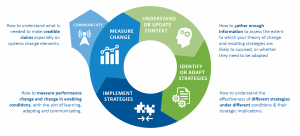Global sustainability challenges are complex problems. These problems cannot be solved by any one actor, any more than a complex system can be fully understood from only one perspective. Recognizing this complexity, sustainability systems are increasingly applying a system thinking approach to better understand the impacts of actions and avoid unintended consequences.
What does it mean to take a systemic approach? How does it work? And what concrete examples do we have?
Sustainability systems are used in a broad range of sectors and provide assurance to consumers, retailers, investors, and other supply chain actors that the products they buy have been produced, traded and processed sustainably. Traditionally, sustainability systems have focused on creating market-based incentives to encourage better enterprise performance. However, it is clear that certain political, cultural and economic conditions need to be in place to enable change in a given region or sector. By addressing these enabling conditions for change in a given context, sustainability systems are seeking to create durable and scalable solutions to key sustainability issues.
In a recently published ISEAL guidance on Improving and Adapting Sustainability Strategies, we provide a framework for how sustainability systems are adapting and improving the effectiveness of their strategies by taking an adaptive learning pathway (featured below). The effectiveness of a sustainability system’s strategies is highly dependent on the context in which those strategies are applied. While one strategy may achieve good results in a particular place, the same approach may have little effect in a different context. This is precisely because the combination of actors and actions needed to drive change is different in different places. This pathway enables sustainability systems to better understand the impact of their approaches and apply systems thinking in practice.

A growing number of the ISEAL member organizations have already applied system thinking in their approaches. Some notable examples across various sectors are featured in ISEAL’s Integrating Systemic Strategies paper. These approaches have enabled sustainability systems to create deeper impact whilst also creating positive conditions to scale impact. This evolving approach clearly strengthens their value proposition to contribute to the wide scale and sustained sustainability performance at the same time avoiding unanticipated and undesirable consequences.
Find out more about ISEAL’s work on influencing change at a systemic level here.
